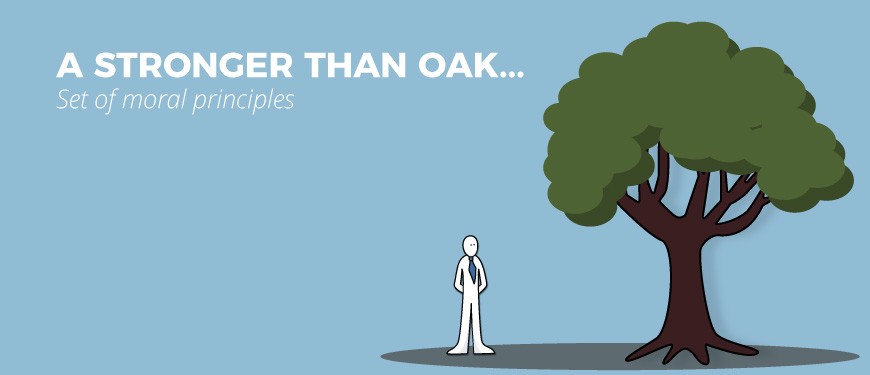Attributes of Outstanding Executives in a Crisis

Attributes of Outstanding Executives in a Crisis
Companies that employ great leaders tend to see positive results even in tough times. Now, more than ever, great leaders are a critical facet of keeping companies afloat through turmoil.
- But what is it that makes a leader great in a crisis?
- What kind of leadership qualities continue to keep the culture intact?
- And how can we all learn and apply lessons we’ve already learned so we don’t reinvent the wheel?
Here are four key attributes that are consistently seen among the best executives.
A Stronger than Oak Set of Moral Principles
Leaders are now being asked to make decisions that impact large groups of people, including employees and customers. As such, good leaders tend to have a high set of moral standards to which they hold themselves, as well as willingness to conform to ethical behaviour (that which is widely accepted by society). This can include anything from how to treat an individual employee fairly, to so-called “grey area” decisions made relative to business transactions or accounting.
In one study reported on by Harvard Business Review, 195 global leaders were asked to rate 74 various leadership competencies on their level of importance. 67% of leaders ranked “has high ethical and moral standards” as one of the most important traits, making it the top noted in the survey.
Generally, we see these leaders choosing to “do the right thing,” which they tend to impart upon those around them as well. While this is important in good times, it is even more important during a crisis, as teams will rally around those leaders upon whom they can trust to do the right thing for the organisation no matter the outcome.
Relentless Communication
Leaders have not only the challenge of being the face of the team, but they must also remain loyal to the team itself by being a team player. Some leaders fall into the trap of believing themselves to be a singular entity who makes the hard decisions and gets the credit. However, great leaders not only remain loyal to their team members, but they also realise they are as dependent on their team members as the team is on them. And in a crisis, the only platform is communication. And dare I say over-communication.
This synergistic relationship, when combined with communication, enables leaders to make effective and intentional decisions that are made to the betterment of the organisation. Likewise, team members who feel they understand what’s going on from their leaders will often dedicate greater effort and loyalty to the organisation as well.
Remember: mutual loyalty and a sense of teamwork between leaders and team members help to keep the momentum going.
Decisiveness and Accountability
While the team is a critical facet of a leader’s success, great leaders must often bear the burden of being the final authority on tough decisions. However, the ability to process information and make a decision in a timely manner is important to keep organisations from stagnating.
In one ten-year study of CEOs, researchers found that high-performing CEOs “do not stand out for making great decisions all the time; rather, they stand out for being more decisive.”
As evidenced, great leaders do not always make the correct decision, but they do make decisions that help the organisation avoid doubt and uncertainty. More importantly, the best leaders know how to take accountability for their actions.
Great leadership consists of being accountable for one’s decisions regardless of the outcome; this type of ownership helps breed the confidence of others in that leader and their future decisions.
Doubling Down on Human Delivery
While the aforementioned qualities are crucial to effective leaders, these are only accentuated by one’s ability to how they communicate. Communication is a two-way street, meaning that the best leaders know how and when to speak, as well as listen (and often forgotten primary human need).
Much like decisiveness, both external and internal communications should be deliberate and concise, but also timely, helping to reassure others and ensure that they understand the heart of the message.
Knowing when it is time to listen to others helps all leaders remain aware and in touch. In a time of crisis, we tend to think our hair is on fire, but that’s also when mistakes are made that can last a lifetime.
Slow down, reflect, and remain self-aware.
Key Takeaway
While this is not an exhaustive list of the traits of strong leaders when facing a crisis, these qualities we discussed to deliver the foundation on the difference between good leaders and great leaders.
The way that we show up as leaders are often highly introspective, continuously looking for more opportunities to focus on pragmatic optimism.
Cultivation of feedback when combined with exhaustive communication and a more decisive behaviour help good leaders become great leaders just when you think the chips are down, raising the bar for themselves and their organisations.
We simply don’t have time for “what if” or “should have.”
While it may seem impossible at the time, how you show up in each moment as a leader will define what happens next.
Author: Bryan Krammer
Source: https://bryankramer.com/leadership-first-attributes-of-outstanding-executives-in-a-crisis/




